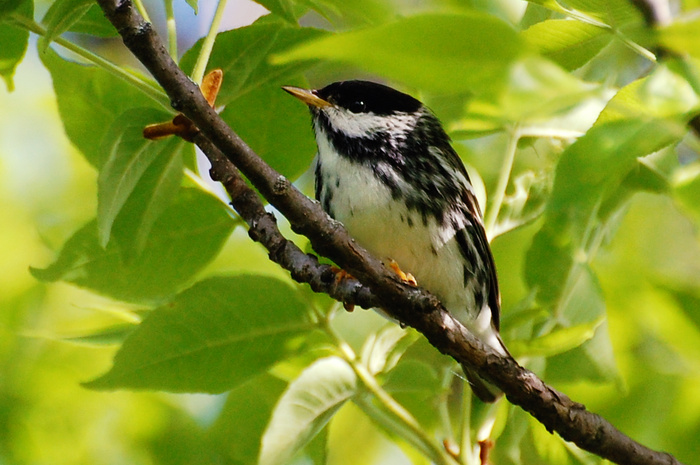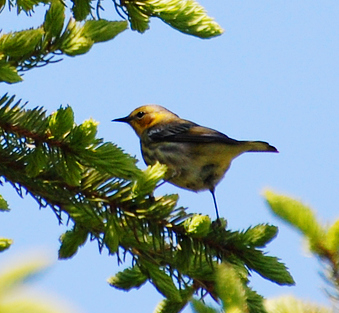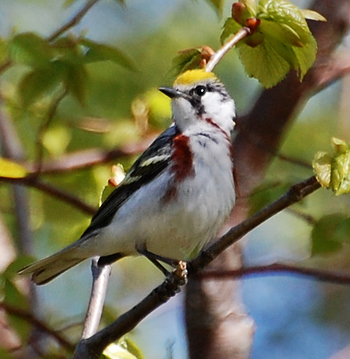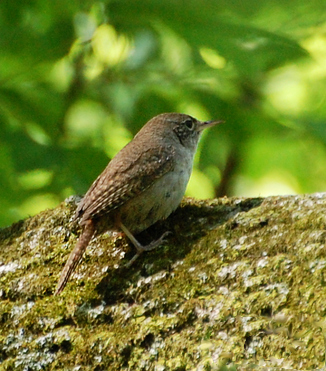
Point Pelee Part 5: Blackpoll Warbler - House Wren
May 22nd, 2010
Blackpoll Warbler: Sort of a chickadee lookalike, the Blackpoll is among the most northern of the warblers, favoring, for its nest sites, stunted spruces and firs at the far edge of the boreal forest. It undergoes an impressive long-distance migration: all the way from South America to northern Canada (and Alaska), and back again in fall. Its song is so high-pitched that some people can't hear it.
This is me taking another liberty. I couldn't photograph the one that showed up at Point Pelee, but got an excellent shot at Mud Lake on Wednesday.

Blue-Gray Gnatcatcher: a tiny, sprightly insectivore. This is a southern bird, rare in Ottawa, but much more common just a few hours south of us. (Also common in Virginia: I've seen bands of them in my parents' back yard.) We saw the species most abundantly (or at least most visibly) in the woods of Oshawa Second Marsh. We also found active nests in a few places. Gnatcatcher nests are really well camouflaged--they just look like tree burls.
Blue Jay: Flocks of these hovered in the air right over the tip of the point. Just hovered, not seeming to go anywhere (maybe because of the strong wind). It was weird--pleasantly surreal. Not sure what they were doing up there since Blue Jays aren't migratory, maybe flycatching? Maybe having fun?
Cape May Warbler: Found a beautiful male, close up and in plain view at Point Pelee--lifer! This warbler, a boreal species that nests in spruce, is seldom seen even in migration--there just aren't that many of them. I managed to get a picture of one at Thickson Woods, although it was kind of far away for my lens.

Chestnut-Sided Warbler: A common but pretty breeding bird in scrubby habitats.

Common Nighthawk: We noticed a large group of people with scopes at a particular point along the trail at Rondeau Park, joined them, and found they were enjoying the sight of a Common Nighthawk resting high up in a tree. Not a lifer, but a bird I seldom see, and the first time I've seen one perched. Nighthawks are semi-nocturnal birds who come out at dusk and dawn (seldom when the sun's up) to hunt insects on the wing. They're identifiable in flight even at a great distance thanks to the white bars across their wing tips (picture).
Despite the name, nighthawks aren't raptors. They're in the same family as Whippoorwills.
Eastern Towhee: One of the handsomest of sparrows, with rufous flanks and deep reddish-brown eyes (see Part 3 for a photo.) Rare in Ottawa, common further south. We only saw one, though.
House Wren: A common species in woodlands everywhere. Lifer! (One of them even fooled me into thinking it was a Brown Creeper, at first. Around these parts, when you see a little brown bird scaling a trunk it's a pretty safe assumption that it's a Brown Creeper. In far-southern Ontario, not so.) I believe I found House Wrens in every location we visited, and I quickly ramped up from knowing very little about them, to recognizing them instantly by sight and sound.
According to the Ottawa checklist they're not rare here, but I'm beginning to wonder if the checklist needs updating, because not only had I never seen one, I don't think I'd ever heard that song either.

To be continued...
May 22nd, 2010
Blackpoll Warbler: Sort of a chickadee lookalike, the Blackpoll is among the most northern of the warblers, favoring, for its nest sites, stunted spruces and firs at the far edge of the boreal forest. It undergoes an impressive long-distance migration: all the way from South America to northern Canada (and Alaska), and back again in fall. Its song is so high-pitched that some people can't hear it.
This is me taking another liberty. I couldn't photograph the one that showed up at Point Pelee, but got an excellent shot at Mud Lake on Wednesday.

Blue-Gray Gnatcatcher: a tiny, sprightly insectivore. This is a southern bird, rare in Ottawa, but much more common just a few hours south of us. (Also common in Virginia: I've seen bands of them in my parents' back yard.) We saw the species most abundantly (or at least most visibly) in the woods of Oshawa Second Marsh. We also found active nests in a few places. Gnatcatcher nests are really well camouflaged--they just look like tree burls.
Blue Jay: Flocks of these hovered in the air right over the tip of the point. Just hovered, not seeming to go anywhere (maybe because of the strong wind). It was weird--pleasantly surreal. Not sure what they were doing up there since Blue Jays aren't migratory, maybe flycatching? Maybe having fun?
Cape May Warbler: Found a beautiful male, close up and in plain view at Point Pelee--lifer! This warbler, a boreal species that nests in spruce, is seldom seen even in migration--there just aren't that many of them. I managed to get a picture of one at Thickson Woods, although it was kind of far away for my lens.

Chestnut-Sided Warbler: A common but pretty breeding bird in scrubby habitats.

Common Nighthawk: We noticed a large group of people with scopes at a particular point along the trail at Rondeau Park, joined them, and found they were enjoying the sight of a Common Nighthawk resting high up in a tree. Not a lifer, but a bird I seldom see, and the first time I've seen one perched. Nighthawks are semi-nocturnal birds who come out at dusk and dawn (seldom when the sun's up) to hunt insects on the wing. They're identifiable in flight even at a great distance thanks to the white bars across their wing tips (picture).
Despite the name, nighthawks aren't raptors. They're in the same family as Whippoorwills.
Eastern Towhee: One of the handsomest of sparrows, with rufous flanks and deep reddish-brown eyes (see Part 3 for a photo.) Rare in Ottawa, common further south. We only saw one, though.
House Wren: A common species in woodlands everywhere. Lifer! (One of them even fooled me into thinking it was a Brown Creeper, at first. Around these parts, when you see a little brown bird scaling a trunk it's a pretty safe assumption that it's a Brown Creeper. In far-southern Ontario, not so.) I believe I found House Wrens in every location we visited, and I quickly ramped up from knowing very little about them, to recognizing them instantly by sight and sound.
According to the Ottawa checklist they're not rare here, but I'm beginning to wonder if the checklist needs updating, because not only had I never seen one, I don't think I'd ever heard that song either.

To be continued...
| ← | → |
